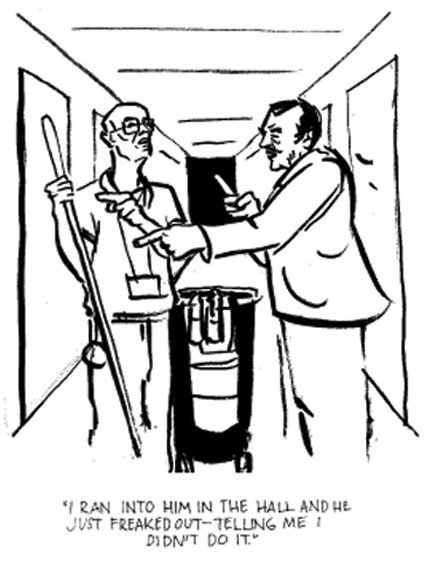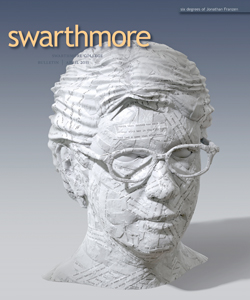The Janitor and the Judge
Using Empathy and Intellect to Make Humane and Right Decisions is the Essence of Practical Wisdom.
When, in spring 2003, Dorwin P. Cartwright Professor of Social Theory and Social Action Barry Schwartz and William R. Kenan Jr. Professor of Political Science Kenneth Sharpe announced that they would be teaching a new course titled Practical Wisdom, students clamored to enroll. The course’s goal was to help the students learn to navigate everyday problems and dilemmas by making “right” decisions based on the use of good judgment and values rather than sterile sets of rules and conventions that typically disregard the individual, the particular, or the discrete. The course, which, Schwartz and Sharpe say, took “three years to plan and a lifetime to arrive at,” was an immediate hit and still is. A book was planned.
Last year, Schwartz and Sharpe, friends and colleagues for more than three decades, published Practical Wisdom: The Right Way to Do the Right Thing (Riverhead Books, 2010). Starting from the premise that human beings are born with the capacity to be wise, they share their thoughts on the importance of developing the kind of wise decision-making skills that evolve from a combination of experience, empathy, and intellect and their value every day in all walks of life. An excerpt follows.
What Wisdom Is
Luke (we don’t know his last name) works as a custodian in a major teaching hospital. In an interview with social scientists interested in studying how people structure their work, Luke reported an incident in which he cleaned a comatose young patient’s room—twice. He had already done it once, but the patient’s father, who had been keeping a vigil for months, hadn’t seen Luke do it and had snapped at him. So Luke did it again. Graciously. Why? Here is how he explained it:
Luke: I kind of knew the situation about his son. His son had been here for a long time and … from what I hear, his son had got into a fight and he was paralyzed. That’s why he got there, and he was in a coma, and he wasn’t coming out of the coma … and I heard how he got that way. He had got into a fight with a black guy and the black guy really, well, you know, because he was here. Well … I went and cleaned his room. His father would stay here every day, all day, but he smoked cigarettes. So, he had went out to smoke a cigarette and after I cleaned the room, he came back up to the room. I ran into him in the hall, and he just freaked out—telling me I didn’t do it. I didn’t clean the room and all this stuff. And at first, I got on the defensive, and I was going to argue with him. But I don’t know. Something caught me and I said, “I’m sorry. I’ll go clean the room.”
Interviewer: And you cleaned it again?
Luke: Yeah, I cleaned it so that he could see me clean it … I can understand how he could be. It was like six months that his son was here. He’d be a little frustrated, and so I cleaned it again. But I wasn’t angry with him. I guess I could understand.
At first glance, the need for wisdom is not built into Luke’s work as a custodian. Indeed, look at his job description:
Operate carpet shampooing and upholstery cleaning equipment ~ Operate mechanical cleaning and scrubbing equipment ~ Strip and wax floor surfaces ~ Maintain entrance area by performing such duties as sweeping, salting, and shoveling ~ Clean grounds and area by performing such duties as picking up paper or trash ~ Unplug commodes, urinals, and sink drains without dismantling the fixture ~ Wet mop floors and stairways ~ Operate vacuum cleaning equipment ~ Clean and wax furniture, cases, fixtures, and furnishings ~ Clean mirrors, interior side of exterior glass, and both sides of interior glass ~ Clean toilet rooms and fixtures ~ Stock restroom supplies ~ Dust venetian blinds while standing on floor or stool ~ Clean patient bedside equipment ~ Make beds and change linen ~ Collect and transport waste materials to central location ~ Wet mop small areas of floor or stairs to clean up such items as spilled liquid or food ~ Replace burned-out incandescent lightbulbs ~ Move and arrange furniture and furnishings ~ Collect and transport soiled linen to central location
Luke’s job description says nothing about responsibility or care for patients. He has a long list of duties, but not a single item on it even mentions another human being. From this description, Luke could be working in a shoe factory or a mortuary instead of a hospital.
If Luke were doing this job, it would have been reasonable for him to have simply explained to the father that he’d already cleaned the room and, perhaps, to have brought in his supervisor to mediate if the father remained angry. Luke might have ignored the man and just gone about his business. He might have gotten angry himself.
But Luke was doing a different job. That’s what a team of research psychologists found when they conducted in-depth interviews with Luke and other hospital custodians about their jobs at a major mid-western academic hospital. The researchers had asked the custodians to talk about their jobs, and the custodians began to tell them stories about what they did. Luke’s stories told them that his “official” duties were only one part of his real job, and that another, central, part of his job was to make the patients and their families feel comfortable, to cheer them up when they were down, to encourage them and divert them from their pain, to give them a willing ear if they felt like talking. Luke aimed to do something different from mere custodial work.
What Luke aimed at would have grabbed Aristotle’s attention. Aristotle laid great stress on the importance of the aims—the telos—of practices like medical care. The aims of the practice—promoting health, curing illness, relieving suffering—need to be embodied in the institution where that practice takes place. Hospitals need to make promoting health their primary aim; it’s the soul of the organization. The practitioners—the hospital staff—need to understand that aim and be encouraged to make it their aim too. To make wise choices at work, these practitioners need to aim at caring for the patients; they need to be motivated by this aim, as Luke was. Aristotle would have talked about the importance of practitioners desiring the right thing if they were to do their work well. Aiming at the right thing doesn’t tell them exactly how to do it—that takes practical skill, not just will. But knowing what to aim at frames and guides their choices—it enables them to choose wisely.
The amazing thing the researchers discovered about Luke and many of his coworkers was that they understood and internalized these aims in spite of their official job description, not because of it. The job they were actually doing was one they had crafted for themselves in light of the aims of medical care. Mike, another custodian, told the researchers how he stopped mopping the hallway floor because Mr. Jones, recovering from major surgery, was out of his bed getting a little much-needed exercise by walking slowly up and down the hall. Charlayne told them about how she ignored her supervisor’s admonitions and refrained from vacuuming the visitors’ lounge while some family members, who were there all day, every day, happened to be napping. These custodians crafted their jobs with the central purpose of the hospital in mind. They were not generic custodians; they were hospital custodians. They saw themselves as playing an important role in an institution whose aim was to see to the care and welfare of patients. So when Luke was confronted by the angry father and he had to decide what to do, he could not look it up in his official job description, because the rules that defined his job said nothing about situations like this. What guided him was the aim of the job he had crafted.
Judgment Day
“Michael’s case appeared routine,” explained Judge Lois Forer. When he was brought before the Criminal Division of Philadelphia’s Court of Common Pleas, he was “a typical offender: young, black, and male, a high-school dropout without a job. . . . And the trial itself was, in the busy life of a judge, a run-of-the-mill event.” The year before, Michael had held up a taxi driver while brandishing a gun. He took $50. Michael was caught and tried. “There was no doubt that Michael was guilty,” said Forer. She needed to mete out punishment. She turned to the state’s sentencing guidelines. They recommended a minimum sentence of 24 months. The law seemed clear. Until Forer looked at the particular circumstances. The gun that Michael brandished, Forer explained, was a toy gun.
Further, this was his first offense: Although he had dropped out of school to marry his pregnant girl friend, Michael later obtained a high school equivalency diploma. He had been steadily employed, earning enough to send his daughter to parochial school—a considerable sacrifice for him and his wife. Shortly before the holdup, Michael had lost his job. Despondent because he could not support his family, he went out on a Saturday night, had more than a few drinks, and then robbed the taxi.
Judge Forer thought that the 24-month sentence was disproportionate. But the sentencing guidelines allow a judge to deviate from the prescribed sentence if she writes an opinion explaining the reasons. “I decided to deviate from the guidelines,” she explained, sentencing Michael to 11½ months in the county jail and permitting him to work outside the prison during the day to support his family:
“I also imposed a sentence of two years probation following his imprisonment conditioned upon repayment of the $50. My rationale for the lesser penalty, outlined in my lengthy opinion, was that this was a first offense, no one was harmed, Michael acted under the pressures of unemployment and need, and he seemed truly contrite. He had never committed a violent act and posed no danger to the public. A sentence of close to a year seemed adequate to convince Michael of the seriousness of his crime.”
![]()
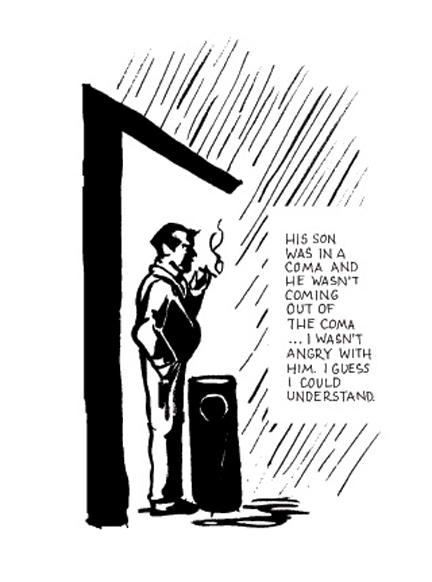 LUKE'S CHOICE OF HOW TO CONFRONT THE ANGRY FATHER and Forer’s choice of the appropriate punishment for Michael couldn’t seem more different. Forer’s work as a judge demands that she interpret general rules in particular circumstances. She needs to know when and how to make an exception. She needs to know how to craft a punishment to fit a person and the circumstances. Wisdom is at the heart of what she does, if it is to be done well. It’s what we need, and what we expect, in judges—the ability to exercise judgment. And judicial wisdom is profoundly practical. Forer could not do her work well without it. And neither could Luke.
LUKE'S CHOICE OF HOW TO CONFRONT THE ANGRY FATHER and Forer’s choice of the appropriate punishment for Michael couldn’t seem more different. Forer’s work as a judge demands that she interpret general rules in particular circumstances. She needs to know when and how to make an exception. She needs to know how to craft a punishment to fit a person and the circumstances. Wisdom is at the heart of what she does, if it is to be done well. It’s what we need, and what we expect, in judges—the ability to exercise judgment. And judicial wisdom is profoundly practical. Forer could not do her work well without it. And neither could Luke.
Forer was committed to finding a just punishment for Michael, but there were competing aims—all legitimate ones—that she had to sort out and balance. It was right that Michael receive a punishment that fit the crime and that the community be protected from any danger he might pose. But it was also right that Michael be rehabilitated so that he would not commit another offense upon release. And it was important that Michael’s sentence do minimal harm to his wife and children, and to his chances of being reintegrated into the community. For Lois Forer, judging was a balancing act. She had to balance retribution, deterrence, and rehabilitation. She had to balance justice and mercy.
And when the angry father confronted him, Luke also had to sort out conflicting aims. There were other legitimate things he might have chosen to do. Be honest: tell the father he had cleaned the room already. Be courageous: stand up to the father’s anger and refuse the unfair demand to clean the room again. But Luke had to determine how to balance these competing aims in this circumstance.
![]()
ARISTOTLE KNEW THAT FIGURING OUT WHAT TO DO in situations like the ones faced by Luke and Judge Forer demanded more than just knowledge of “the facts.” It demanded more than knowledge of the law and the rules and the job description. It demanded more than knowing how to deduce the right thing to do from a set of abstract principles about truth or justice or freedom or goodness. There was no general rule or principle to which Forer or Luke could turn to balance or choose among several good aims that were in conflict. To do this kind of balancing and choosing, Luke and Forer needed wisdom. They needed practical moral skill.
Aristotle emphasized two capacities that were particularly important for such practical skill—the ability to deliberate about such choices and the ability to perceive what was morally relevant in a particular circumstance. Good deliberation and discernment were at the heart of practical wisdom. Forer articulates how she deliberated about Michael’s case. A good judge needs to do this all the time in publicly defending her decisions, and in Michael’s case the law demanded that she explain why she was deviating from the recommended sentence.
Luke’s deliberation took place in radically different circumstances—in a situation in which we largely expect neither wisdom nor nuanced accountability—but it is equally important, if not more important, to consider both how he deliberated and how he talked about his decision. He figured out that the confrontation with the father was not one that should be framed in terms of honesty and integrity, nor as a defense of Luke’s rights. Although Luke was tempted to react to the father’s demands as an issue of injustice, he quickly saw that something else was at stake—helping to comfort and heal the sick and injured. So Luke framed the issue as one of how to care for and sustain the relationship of this father and this son at this particular trying moment in their lives. Justice and fairness could wait for another day.
And Luke’s deliberation went further. He also had to figure out what courses of action were possible in this situation. Should he calmly explain to the father that he recognized the father’s pain and understood? Should he offer to sit down and discuss the situation? Luke chose not to make an issue of it, not to fuel the father’s anger. He decided that the best and most practical way to handle the situation was to clean the room again and to let the father think he’d accomplished something for his son. Luke had the skill to respond generously and with good grace.
 When we think about deliberative skills, the first image that often comes to mind is a process in which we lay out the options, weigh the pros and cons, and then pick what seems best. All of us have deliberated this way. Courses in business and management schools often teach this method as the model of good decision making. This kind of decision making can be particularly useful when we are faced with new or tough problems and have the time to ponder them. But Luke’s behavior makes us think about other kinds of deliberative skills.
When we think about deliberative skills, the first image that often comes to mind is a process in which we lay out the options, weigh the pros and cons, and then pick what seems best. All of us have deliberated this way. Courses in business and management schools often teach this method as the model of good decision making. This kind of decision making can be particularly useful when we are faced with new or tough problems and have the time to ponder them. But Luke’s behavior makes us think about other kinds of deliberative skills.
Luke did not lay out conflicting aims or weigh the pros and cons of all the options. What was important for Luke was how to frame the situation. The unreasonableness of the request and the father’s anger may have tempted Luke to frame the situation as one about honesty, rights, or justice, but instead he framed it in light of the job as he had crafted it, the way he saw the purpose of being a hospital custodian. And Luke’s ability to do this was enabled by a capacity he had for good storytelling. Luke could tell himself, and the interviewer, a narrative about this patient who “had got into a fight” and about an upset father who had been visiting him, caring for him, for months. This story, and the frame it provided, enabled Luke to discern what to do. Luke wasn’t laying out options. And he wasn’t simply deducing what to do from some general principle of proper behavior (like “be kind to patients’ families”). The story Luke told explained how the father came to be yelling at Luke to clean the room again, why the anger made sense, and why it was forgivable. And this story helped Luke figure out his role in the evolving narrative. Our ability to frame situations well and tell good stories is critical to practical moral skill. So, too, is the ability to use analogies and metaphors to draw on our past experiences. Luke knew what to do not because he had done exactly the same thing before, but because he could draw on previous experiences that were something like the current situation. He knew what the consequences had been of actions he had taken in these past cases. He wasn’t just repeating what he’d always done; he was crafting something new from what had or had not worked in the past.
This may seem like making a lot of Luke’s instant decision, but Judge Forer used the same deliberative skills. To interpret the law in Michael’s case she needed more than the facts, more than the legal guidelines, and more than the ability to make logical deductions. She needed to create an accurate narrative that made sense of Michael’s actions and his intentions in light of his character and circumstances—his stable family and work history, the job crisis and the depression he was going through, the nature of the crime and choice of weapon, the harm done—all this to judge the seriousness of his crime and the severity of his punishment. She understood Michael by drawing on her past experience, by interpreting the similarities and differences he shared with other criminals she had judged.
Aristotle tells us that “in matters concerning action and questions of what is beneficial, the agent must consider on each different occasion what the situation demands, just as in medicine and in navigation.” Figuring out what is appropriate in a particular situation rests on moral perception. “A man of practical wisdom,” argued Aristotle, must “take cognizance of particulars.” Particular facts are the “starting points” for our knowledge of “the goal of action” and, to deliberate and choose well, “one must have perception of particular facts.” Every day in court, Judge Forer had to sort through a deluge of information about the lives of the defendants and the nature of their misdeeds. To determine motives, to parcel out responsibility, to understand how this crime was different from or similar to others, to determine the future danger to the community—these tasks demanded an ability to pick what was significant out of a lot of background noise. These tasks demanded an ability to see the nuance—the gray—of a particular situation, and not simply the black-and-white of the legal and the illegal.
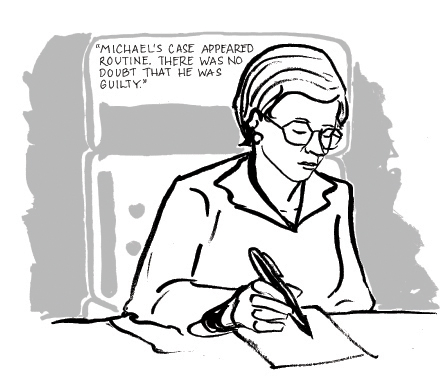 Luke, too, was faced daily with patients who were upset, confused, disoriented, troubled; who were experiencing multiple and contradictory emotions. When he was confronted with choices about how to care for such people, just like judges, doctors, lawyers, therapists, or teachers, Luke had to sort through a welter of information and figure out which things were the most important to deal with in the moment. A critical part of the context that Luke had to perceive was what the father was thinking and feeling. If Luke had been unable to discern this, he wouldn’t have had a clue about what the problem was, what the options were, or what the consequences of his response to the father might be. Luke had to imagine how arguing with the father would affect the man’s feelings of anger and frustration, and his ability to remain hopeful and to maintain his vigil day after day. Moral imagination—the ability to see how various options will play themselves out and the ability to evaluate them—is thus critical to perception. It represents, philosopher John Dewey explained, “the capacity to concretely perceive what is before us in light of what could be.”
Luke, too, was faced daily with patients who were upset, confused, disoriented, troubled; who were experiencing multiple and contradictory emotions. When he was confronted with choices about how to care for such people, just like judges, doctors, lawyers, therapists, or teachers, Luke had to sort through a welter of information and figure out which things were the most important to deal with in the moment. A critical part of the context that Luke had to perceive was what the father was thinking and feeling. If Luke had been unable to discern this, he wouldn’t have had a clue about what the problem was, what the options were, or what the consequences of his response to the father might be. Luke had to imagine how arguing with the father would affect the man’s feelings of anger and frustration, and his ability to remain hopeful and to maintain his vigil day after day. Moral imagination—the ability to see how various options will play themselves out and the ability to evaluate them—is thus critical to perception. It represents, philosopher John Dewey explained, “the capacity to concretely perceive what is before us in light of what could be.”
Not surprisingly, then, empathy—the capacity to imagine what someone else is thinking and feeling—is critical for the perception that practical wisdom demands. Such empathy involves both cognitive skill—the ability to perceive the situation as it is perceived by another—and emotional skill—the capacity to understand what another person is feeling. Luke had to put himself in the shoes of the father even though he knew the father was wrong. Luke could not have provided the narrative he did without this capacity for getting himself into the heart of the father. And the same was true of Judge Forer. To find the right sentence, she needed the empathy to put herself in Michael’s shoes and to imagine the likely consequences of letting Michael work outside of prison during the day. She asked herself: Was this an irrational crime? Was there wanton cruelty? Is this a hostile person? Can this person control himself?
Emotion is critical to moral perception in another way. It is a signaling device. The emotion of the father—“he just freaked out”—signaled to Luke that something was wrong. With that kind of anger, the signal was not subtle, but often it is. Reading the facial expressions, the body language, the tone of voice of another alerts us that something is wrong and that we need to make choices about how to respond. Our own feelings of anger, guilt, compassion, or shame signal us to reflect, to pay special attention to what is happening. This may sound obvious, but all too often the rules and incentives that govern our lives are all about removing emotion from our decision making—about not trusting the signal we’re sending ourselves. Luke recognized his own frustration and rising anger as well as the father’s and was alerted to consider whether this confrontation was about Luke or about the father and his situation.
There is a long history of suspicion that emotion is the enemy of good reasoning and sound judgment, and rightly so. Emotions can often control us instead of the reverse. “The devil made me do it.” Emotions can prejudice us toward people we love, and against those we don’t. Emotions can be unstable and therefore unreliable as guides. Emotions are sometimes too particular: we can feel so passionately about something that happened to us, or about this wronged patient or that ill-fed child, that our judgment is clouded about “what is just” or “what is fair” in general. And emotions almost got the better of Luke. For a moment, he felt angry at the injustice of the father’s demand. But emotion also served Luke well. He felt compassion for the father: “It was like six months that his son was here. He’d be a little frustrated, and so I cleaned it again. But I wasn’t angry with him.” So emotion was critical in guiding Luke to do the right thing. Luke’s emotions were not random—unstable and uneducated. He was compassionate about the right things and angry about the right things. And he had the self-control—the emotion-regulating skills—to choose rightly. Emotions properly trained and modulated, Aristotle told his readers, are essential to being practically wise: We can experience fear, confidence, desire, anger, pity, and generally any kind of pleasure and pain either too much or too little, and in either case not properly. But to experience all this at the right time, toward the right objects, toward the right people, for the right reason, and in the right manner—that is the median and the best course, the course that is a mark of virtue.
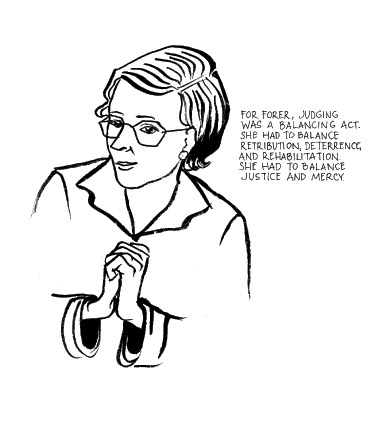 Sizing up the situation, figuring what’s relevant in this particular case and these particular circumstances, imagining what someone else is thinking and feeling, recognizing the options and imagining the consequences—all these skills are part of being perceptive. It is this perception that enables us to recognize the uniqueness of a particular situation. Such perception is “a process of loving conversation between rules and concrete responses, general conceptions and unique cases, in which the general articulates the particular and is in turn further articulated by it.”
Sizing up the situation, figuring what’s relevant in this particular case and these particular circumstances, imagining what someone else is thinking and feeling, recognizing the options and imagining the consequences—all these skills are part of being perceptive. It is this perception that enables us to recognize the uniqueness of a particular situation. Such perception is “a process of loving conversation between rules and concrete responses, general conceptions and unique cases, in which the general articulates the particular and is in turn further articulated by it.”
Practical wisdom demands more than the skill to be perceptive about others. It also demands the capacity to perceive oneself—to assess what our own motives are, to admit our failures, to figure out what has worked or not and why. We get a glimpse of the importance of such self-reflection in Luke. “At first, I got on the defensive, and I was going to argue with him. But I don’t know. Something caught me and I said, ‘I’m sorry. I’ll go clean the room.’” Such self-reflection is not always so easy when, like Luke, we feel we’ve been wronged. And it’s also difficult when we’ve been wrong—thoughtless, careless, too self-interested. Being able to criticize our own certainties is often a painful struggle, demanding some courage as we try to stand back and impartially judge ourselves and our own responsibility. For Luke to be a good hospital custodian, and Forer a good judge, they needed the ability to recognize their mistakes so they could do better next time.
LUKE AND JUDGE FORER HELP US UNDERSTAND some of the key characteristics of practical wisdom. To summarize:
1. A wise person knows the proper aims of the activity she is engaged in. She wants to do the right thing to achieve these aims—wants to meet the needs of the people she is serving.
2. A wise person knows how to improvise, balancing conflicting aims and interpreting rules and principles in light of the particularities of each context.
3. A wise person is perceptive, knows how to read a social context, and knows how to move beyond the black-and-white of rules and see the gray in a situation.
4. A wise person knows how to take on the perspective of another—to see the situation as the other person does and thus to understand how the other person feels. This perspective-taking is what enables a wise person to feel empathy for others and to make decisions that serve the client’s (student’s, patient’s, friend’s) needs.
5. A wise person knows how to make emotion an ally of reason, to rely on emotion to signal what a situation calls for, and to inform judgment without distorting it. He can feel, intuit, or “just know” what the right thing to do is, enabling him to act quickly when timing matters. His emotions and intuitions are well educated.
6. A wise person is an experienced person. Practical wisdom is a craft and craftsmen are trained by having the right experiences. People learn how to be brave, said Aristotle, by doing brave things. So, too, with honesty, justice, loyalty, caring, listening, and counseling.
Reprinted from Practical Wisdom by Barry Schwartz and Kenneth Sharpe by arrangement with Riverhead Books, a member of Penguin Group (USA) Inc. Copyright © 2010 by Barry Schwartz and Kenneth Sharpe.
 Meredith Leich ’08 is a Brooklyn-based words/images artist, who works at the Six Points Fellowship—a project that supports artists who create new work exploring Jewish ideas and experiences. She also plays the violin and viola, writes comics, and spends time in Berlin as well as designing websites. To see more of her art, visit meredithleich.com
Meredith Leich ’08 is a Brooklyn-based words/images artist, who works at the Six Points Fellowship—a project that supports artists who create new work exploring Jewish ideas and experiences. She also plays the violin and viola, writes comics, and spends time in Berlin as well as designing websites. To see more of her art, visit meredithleich.com
 Email This Page
Email This Page